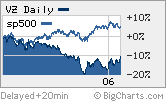|
Verizon to cable: Hear us now!
CEO of the telecom titan defends spending plan, takes on cable companies, Vonage and AT&T.
NEW YORK (CNNMoney.com) – There was no static in Ivan Seidenberg's message to competitors and investors on Thursday: The chairman and CEO of Verizon made no apologies for plans to spend billions of dollars building out a fiber-optic network to compete with cable companies. "No one should ever doubt our resolve. That would be a huge mistake," Seidenberg said.
Seidenberg, speaking at the Media Summit New York conference, was on the counterattack a day after Brian Roberts, head of Comcast (Research), the nation's largest cable firm, said at the same conference that Verizon (Research) was spending "gobs of money" on its FiOS television offering and would ultimately fail to win significant market share in video. "Customers will decide if we're doing the right thing," Seidenberg said, adding that the company has already done a good job of adding high-speed data and video customers in the few markets where it has already launched FiOS. "People love the product. Cable companies are vulnerable." He added that criticism of the company's capital expenditures is nothing new, recalling similar charges about investments in the wireless business. Now, Verizon Wireless is the shining star of the company. Verizon, like many of its telecom and cable rivals, has been a laggard on Wall Street. Shares of Verizon tumbled 22 percent in 2005, making it one of the worst performing stocks in the Dow Jones Industrial Average. Investors have been concerned about Verizon's aggressive spending plans, cutthroat price competition, and new challenges from cable firms and Internet phone company Vonage, which filed for an initial public offering Wednesday. In addition, some investors believe Verizon may have overpaid for long-distance firm MCI. Verizon engaged in a bidding war with rival Baby Bell Qwest (Research) for MCI throughout last year. The $8.5 billion dollar deal for MCI closed last month. Seidenberg was realistic when talking about his company's stock performance. "Investors naturally recognize that there is a lot of price compression in telecom. I'm not sure we have proved to investors that we can innovate fast enough to offset the price compression," he said. But Seidenberg stressed that the only way for his company to remain competitive is by investing in technology that will enable Verizon to launch new products. "The last thing we need is companies getting scared to invest," he said. Seidenberg also didn't pull any punches when talking about other telecom competitors. When asked about Vonage, Seidenberg said that he thought the company's voice over Internet protocol (VoIP) product was one that was attractive to early technology adopters but he did not think the company had a viable long-term business model. And when asked about whether or not he would have changed the company's name to AT&T if Verizon bought the firm, he quipped, "I didn't put my company in a position to have to do that." Verizon's top telecom challenger, Baby Bell SBC, acquired AT&T for nearly $17 billion last year and subsequently changed its name to AT&T (Research). Seidenberg also said that he expected consolidation in the telecom business to continue. He wouldn't comment about any specific deals that Verizon was willing to make but hinted that the company may one day look to expand internationally. "There are a lot of people in the world we don't serve," he said. For more about why Comcast doesn't fear Verizon, click here.
For a look at why FORTUNE thinks Verizon's CEO is on the hot seat, click here. |
| ||||||||||||||||||||||||||||||||||||


